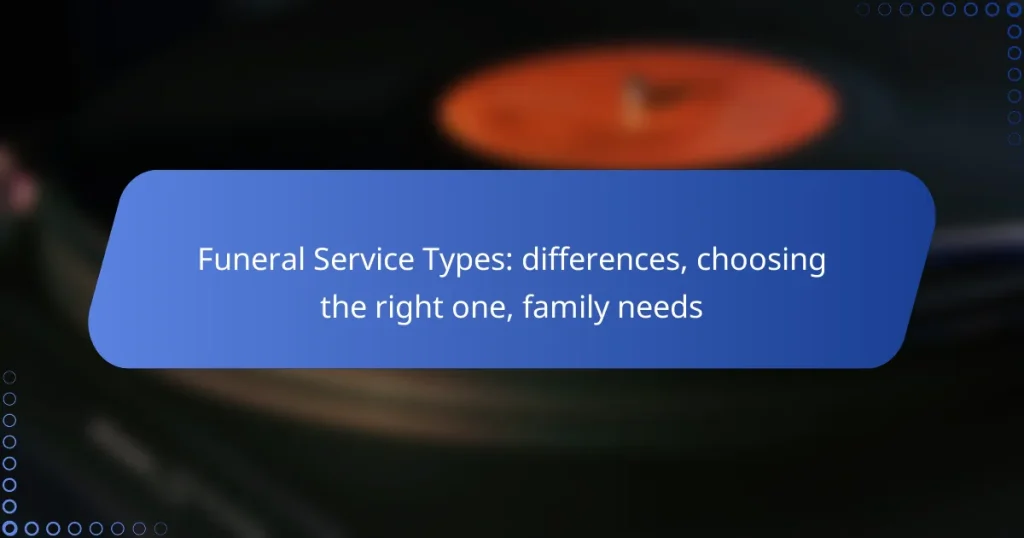When faced with the task of planning a funeral, families in Canada have a variety of service types to choose from, including traditional funerals, cremation services, and green burials. Selecting the right option involves careful consideration of budget, personal preferences, and any cultural or religious practices that may influence the decision. Understanding these differences is crucial to ensure a meaningful tribute that honors the deceased while addressing the needs of the family.

What are the types of funeral services available in Canada?
In Canada, there are several types of funeral services that cater to different preferences and cultural practices. The main options include traditional funerals, cremation services, green burials, memorial services, and direct burials, each with distinct features and considerations.
Traditional funeral service
A traditional funeral service typically involves a viewing, a formal ceremony, and burial. This service often includes a casket, flowers, and a procession to the burial site, allowing family and friends to pay their respects in a structured environment.
When selecting a traditional service, consider the deceased’s wishes, cultural practices, and family traditions. Costs can vary widely, often ranging from several thousand to over ten thousand Canadian dollars, depending on the choices made.
Cremation service
Cremation services involve the incineration of the body, followed by the handling of the ashes according to the family’s wishes. This option can be more cost-effective than traditional burial, with prices generally ranging from one thousand to five thousand Canadian dollars.
Families can choose to keep the ashes in an urn, scatter them in a meaningful location, or incorporate them into memorial items. It’s essential to discuss the options with the funeral provider to ensure all legal and regulatory requirements are met.
Green burial service
A green burial service focuses on environmentally friendly practices, using biodegradable materials and natural burial sites. This option minimizes the use of chemicals and non-biodegradable caskets, appealing to those who prioritize sustainability.
Costs for green burials can vary, but they often remain comparable to traditional burials. Families should research local green burial grounds and inquire about their specific practices to ensure they align with their values.
Memorial service
A memorial service is a gathering held to honor the deceased without the presence of the body. This service can take place weeks or even months after death, allowing for more flexibility in planning and participation.
Memorial services can be personalized to reflect the deceased’s life and interests, often incorporating music, readings, and shared memories. Costs can vary widely based on location and arrangements, making it a versatile option for families.
Direct burial service
Direct burial services involve burying the body shortly after death without a formal viewing or ceremony. This option is often the most economical, typically costing less than traditional funerals.
Families opting for direct burial should consider holding a memorial service at a later date if they wish to gather friends and family to celebrate the life of the deceased. It’s important to confirm all local regulations regarding direct burials to ensure compliance.

How to choose the right funeral service for your family?
Choosing the right funeral service for your family involves understanding your budget, preferences, and any cultural or religious requirements. It’s essential to consider these factors to ensure that the service reflects the wishes of the deceased and meets the needs of the family.
Consider budget and costs
Funeral costs can vary significantly based on the type of service, location, and additional features. Basic services may start in the low thousands of USD, while more elaborate arrangements can reach tens of thousands. Establishing a budget early can help narrow down options and prevent overspending.
Consider all potential expenses, including transportation, caskets, and venue fees. Some families opt for direct cremation or burial, which can be more economical, while others may choose traditional services with viewings and receptions.
Evaluate family preferences
Family preferences play a crucial role in determining the type of funeral service. Discussing what each family member envisions can help create a service that honors the deceased while accommodating everyone’s wishes. Some may prefer a simple gathering, while others might want a more formal ceremony.
Consider the deceased’s personality and values as well. A service that reflects their life and interests can provide comfort and closure to family and friends. Gathering input from family members can lead to a more meaningful experience.
Assess religious or cultural needs
Religious and cultural beliefs often dictate specific practices and rituals during funeral services. Understanding these needs is essential for honoring the deceased appropriately. For example, some cultures require specific rites or timelines, while others may have particular preferences for burial or cremation.
Consulting with religious leaders or cultural representatives can provide guidance on necessary traditions. This ensures that the service aligns with the family’s beliefs and offers a respectful farewell.
Consult with a funeral director
Engaging a funeral director can simplify the process of selecting the right service. They can provide valuable insights into available options, costs, and logistics. A knowledgeable director can help families navigate their choices while ensuring compliance with local regulations.
When meeting with a funeral director, prepare a list of questions regarding services, pricing, and any specific requests. This will help clarify expectations and facilitate a smoother planning process. Don’t hesitate to ask for itemized estimates to compare costs effectively.

What are the key factors in funeral service planning?
When planning a funeral service, key factors include the location of the service, the type of disposition chosen, personalization options, and any legal requirements. Each of these elements plays a crucial role in creating a meaningful farewell that meets the family’s needs and preferences.
Location of the service
The location of the funeral service can significantly impact the experience for family and friends. Common venues include funeral homes, places of worship, or even outdoor settings. Consider accessibility, capacity, and the deceased’s wishes when selecting a location.
It’s also important to think about the atmosphere you want to create. A more formal setting may suit traditional services, while a casual location might be appropriate for a celebration of life. Always check the venue’s policies regarding services and any associated costs.
Type of disposition chosen
The type of disposition refers to how the body will be handled after death, with common options being burial, cremation, or donation to science. Each choice has different implications for the service and can reflect personal or cultural beliefs.
Burial often involves a graveside service, while cremation may allow for a memorial service at a later date. Discussing these options with family can help ensure that the chosen method aligns with everyone’s values and preferences.
Personalization options
Personalization options allow families to create a unique tribute that honors the deceased’s life. This can include customized services, such as specific music, readings, or themes that reflect the person’s interests and personality.
Incorporating personal touches, like photo displays or memory tables, can enhance the service’s emotional impact. Consider what elements would best celebrate the individual’s life and resonate with attendees.
Legal requirements in Canada
In Canada, legal requirements for funerals can vary by province but generally include obtaining a death certificate and ensuring proper permits for burial or cremation. Families should be aware of the necessary documentation and processes involved to avoid delays.
It’s advisable to consult with a funeral director who understands local regulations to ensure compliance. They can guide you through the legalities, helping to streamline the planning process and focus on honoring your loved one.

What are the benefits of pre-planning a funeral service?
Pre-planning a funeral service offers significant advantages, including financial savings and reduced emotional burden on family members. By making arrangements in advance, individuals can ensure their wishes are honored while alleviating stress during a difficult time.
Cost savings and budgeting
Pre-planning a funeral can lead to substantial cost savings. Many funeral homes offer fixed pricing for services when booked in advance, protecting against inflation and unexpected price increases. Additionally, families can compare options and make informed decisions without the pressure of immediate arrangements.
Budgeting for a funeral can be challenging, but pre-planning allows individuals to allocate funds specifically for this purpose. Setting aside a dedicated amount, such as a few thousand dollars, can help cover costs like caskets, services, and burial fees, ensuring that financial considerations are managed ahead of time.
Reducing family stress
One of the primary benefits of pre-planning is the reduction of stress for family members during a challenging time. When arrangements are made in advance, loved ones are spared the emotional burden of making decisions while grieving. This clarity can foster a more supportive environment for family members to focus on healing.
Moreover, pre-planning allows individuals to communicate their wishes clearly, minimizing potential conflicts among family members. By documenting preferences for services, burial, and memorials, families can avoid misunderstandings and ensure that the deceased’s desires are respected, leading to a more harmonious experience for everyone involved.


